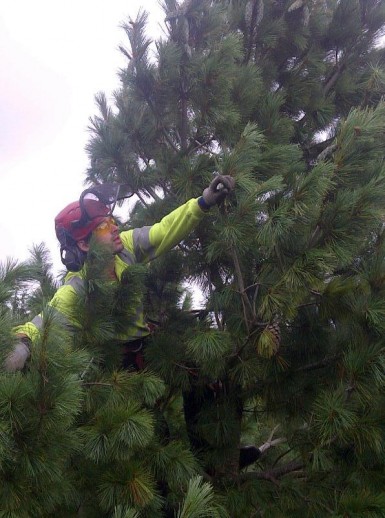
It seems that every week we hear of new diseases threatening our trees. Here’s some news from the Forestry Commission, of a more resistant pine which could provide some respite in the battle.
A little known tree looks set to become the secret weapon of our woodlands in their life and death battle against pests and diseases.
Wales’s forests are coming under increasing threat as the climate changes – but now foresters hope the rarely planted Macedonian Pine could lead the fightback against never-before seen invaders.
The tree, which originated in the Balkans, appears to be more resistant than other pines to the effects of Dothistroma Needle Blight (DNB), a disease which is attacking its more common cousin, Corsican Pine.
The disease forced Forestry Commission Wales to stop planting Corsican Pine in 2006, but foresters believe Macedonian Pine’s resistance to DNB could provide some answers as they look to increase the diversity of tree species in our woodlands.
FC Wales’s Silvicultural Operations Team (WSO) has collected thousands of cones from Macedonian Pine stands across North Wales in the first part of a process that could change the face of Welsh Government woodlands.
They scoured thousands of hectares of forests in Newborough, Alwyns, Nercwys and Coed-y-Brenin to find the seeds which will eventually be re-planted as young trees.
The seeds will be extracted from the cones and pre-treated over several months before being sown at an FC nursery in Delamere and then brought back to Wales in 2015 to be planted.
The operation was overseen by WSO Operations Manager, Neil Muir, who led a team of Seed Liaison Officers to track down the Macedonian Pine trees.
A local contractor, John Sweeney, was then engaged to climb the trees and collect over 1,200kgs of cones, which could potentially yield more than 80,000 plants – more than four times the 15,000 Macedonian Pine trees planted by Forestry Commission Wales in 2010/11.
Neil said, “It proved difficult to source seed because Macedonian Pine has not been widely planted and exists mainly in small coupes, or areas.
“But it can grow on a range of sites and so far has proved more resistant to Dothistroma Needle Blight so would offer an alternative tree species.
“We’re delighted with the number of cones collected. The trees we found were of good quality and form, and the seed should prove suitable in the same locations.”
The Macedonian Pine is one of a variety of lesser known tree species across Wales from which cones and seeds are being collected and examined by Forestry Commission scientists at Alice Holt Research Station in Farnham, Surrey.
Tony Westley, WSO Establishment Manager, said, “I’ve been the main seed collector in WSO for a few years, but this has been the most interesting operation to date.
“I did some collecting of Macedonian Pine last year but with little success. But this has been an excellent coning year and the system has worked really well.”
Fellow Establishment Manager Bruce Theobald said, “We collected an unheard of amount of seed and I look forward to seeing the trees back in North Wales when they come back from the nursery.”